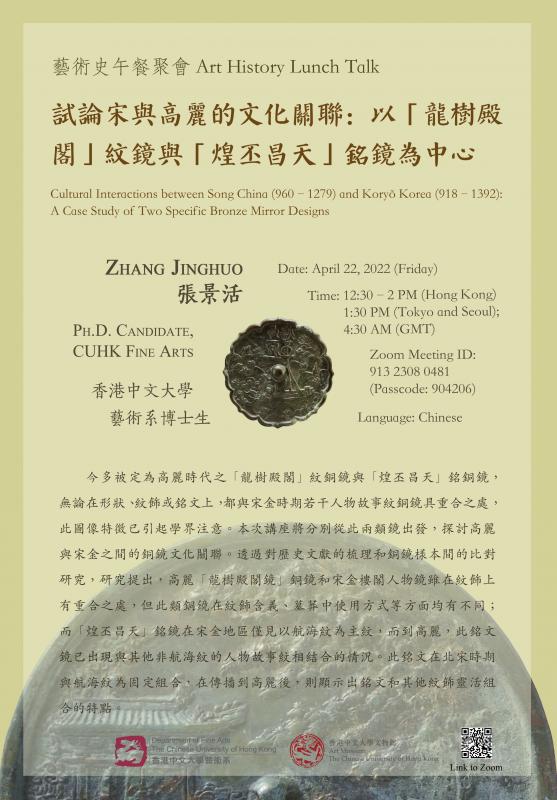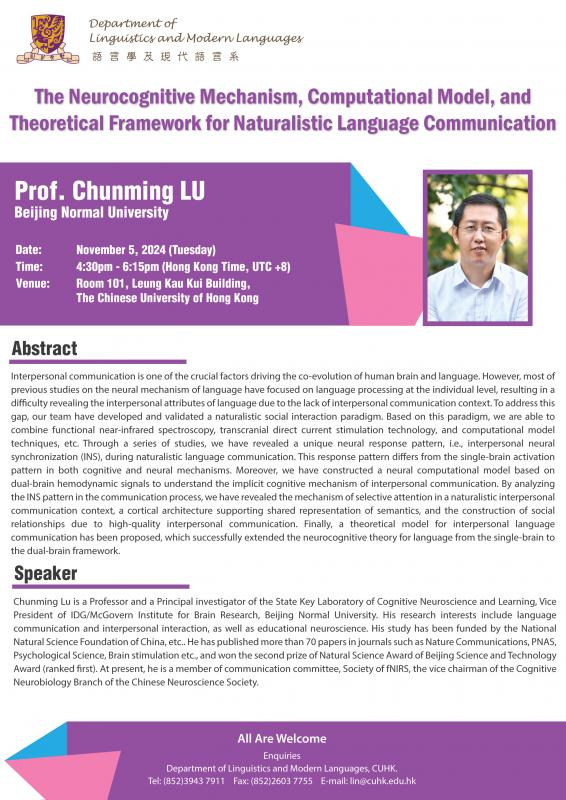RPCAA Lecture Series 2022 (4): Virtual-Real Integration Technology and the Popularisation of Historical
中研院史語所文物館長年展示豐富的考古發掘與歷史文獻,在呈現史語所工作成果的同時,我們希望能透過生動有趣的展示,突破古代文物展覽的侷限,拉近與現代觀者的距離,寓教於樂。
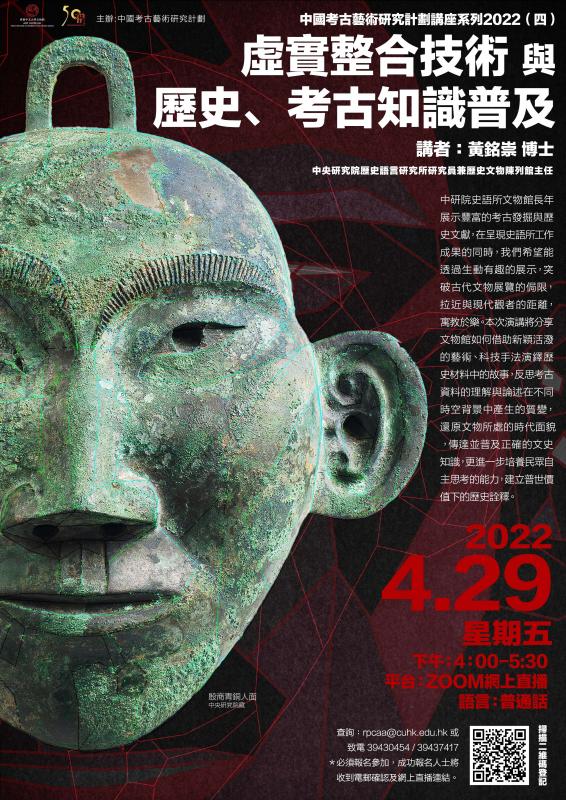
本次演講將分享文物館如何借助新穎活潑的藝術、科技手法演繹歷史材料中的故事,反思考古資料的理解與論述在不同時空背景中產生的質變,還原文物所處的時代面貌,傳達並普及正確的文史知識,更進一步培養民眾自主思考的能力,建立普世價值下的歷史詮釋。
講者
黃銘崇博士 (Dr. Hwang Ming-chorng)
中央研究院歷史語言研究所研究員兼歷史文物陳列館主任
(Research Fellow and Director of MIHP)
黃銘崇研究員為臺灣大學土木系學士、麻省理工學院建築學碩士、哈佛大學東亞系博士,主要領域為東亞上古史。其研究結合甲骨金文紀錄、考古發掘材料、美術史資料及社會科學理論模型,綜合出古代文明的新圖象。
黃研究員現兼任文物館主任,策劃多檔實體與線上展覽,包括「虛實漫遊——博物館的動物園」AR導覽,與歷史博物館合作之「東周實相——河南出土東周文物展」,中研院開放博物館「商王武丁的藍寶堅尼」、「商王洗澡,要洗熱水」、「通天神龜YH127」等線上展示,結合動漫元素與新創科技的「為己而來——被史家耽誤的女人」多媒體互動展,及運用線上平臺和數位媒介製作的「進擊的大帥——西周大將伯懋父」等等。
Enquiry
rpcaa@cuhk.edu.hk / 39430454
Other Upcoming Events
Philosophy - Departmental Seminar: Human-Machine Relations: A Phenomenology of Becoming

Speaker
Prof. Yvonne Foerster
Visiting Scholar, Department of Philosophy, the Chinese University of Hong Kong
Professor of Philosophy, Shanxi University Taiyuan, China
Enquiry
Tel: 3943 7135
Email: philosophy@cuhk.edu.hk
Other Upcoming Events
Chinese Culture in Translation: Sinologists as Translators
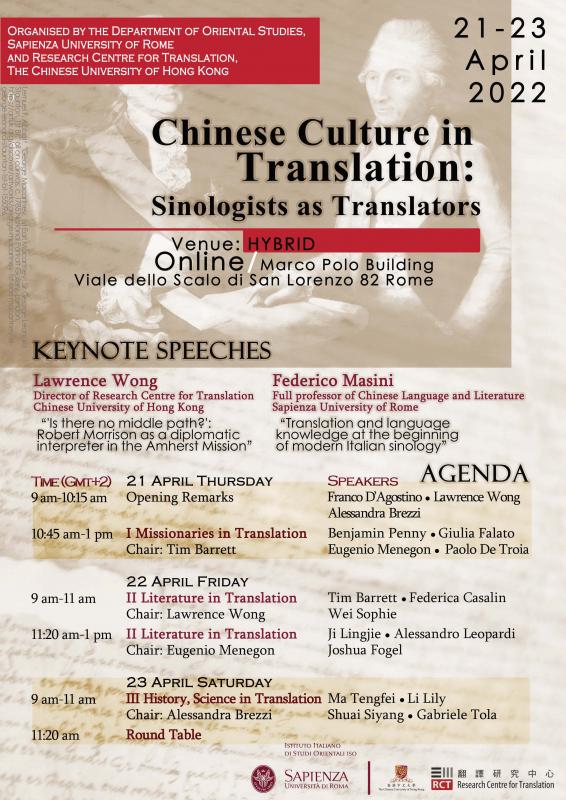
漢學家的翻譯活動是中外文化交流史上非常重要的課題。自從西方人在17世紀開始來到中國,進行貿易或傳教,中國典籍便透過漢學家翻譯和傳揚到國外去。這些漢學家的背景、來華目的、翻譯動機、以至他們的中文水平以及理解中國典籍的能力都很不一樣,大大地影響了他們翻譯中國典籍的活動。這些漢學家的翻譯,促進了中國典籍、文學的對外傳播,也構建了西方國家對中國的理解。本次研討會便是希望可以在國際學者合作研究下對這重要的課題作深入探討。
Enquiry
rct@cuhk.edu.hk
Other Upcoming Events
The Journey of Bringing Manchu Online
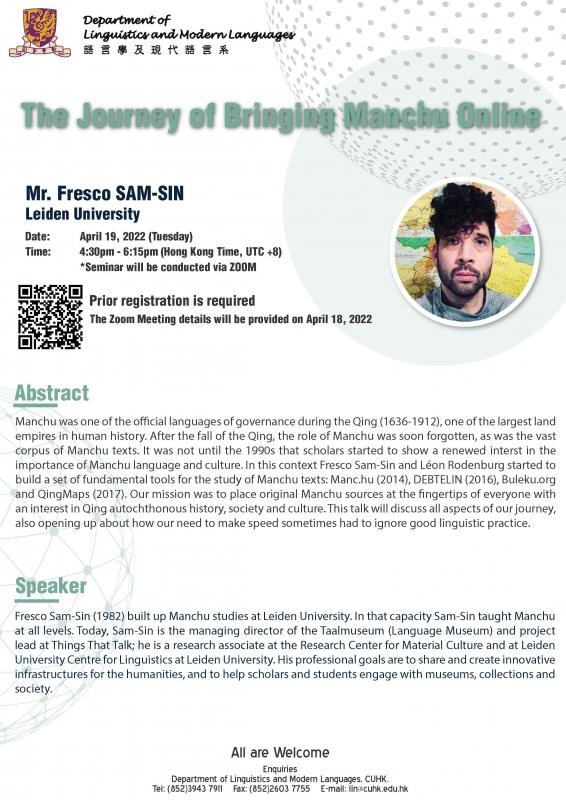
Manchu was one of the official languages of governance during the Qing (1636-1912), one of the largest land empires in human history. After the fall of the Qing, the role of Manchu was soon forgotten, as was the vast corpus of Manchu texts. It was not until the 1990s that scholars started to show a renewed interst in the importance of Manchu language and culture. In this context Fresco Sam-Sin and Léon Rodenburg started to build a set of fundamental tools for the study of Manchu texts: Manc.hu (2014), DEBTELIN (2016), Buleku.org and QingMaps (2017). Our mission was to place original Manchu sources at the fingertips of everyone with an interest in Qing autochthonous history, society and culture. This talk will discuss all aspects of our journey, also opening up about how our need to make speed sometimes had to ignore good linguistic practice.
Speaker:
Mr. Fresco SAM-SIN (Leiden University)
Fresco Sam-Sin (1982) built up Manchu studies at Leiden University. In that capacity Sam-Sin taught Manchu at all levels. Today, Sam-Sin is the managing director of the Taalmuseum (Language Museum) and project lead at Things That Talk; he is a research associate at the Research Center for Material Culture and at Leiden University Centre for Linguistics at Leiden University. His professional goals are to share and create innovative infrastructures for the humanities, and to help scholars and students engage with museums, collections and society.
Other Upcoming Events
World History Seminar (2021-22) Lecture 11: West African and World History: A New Perspective
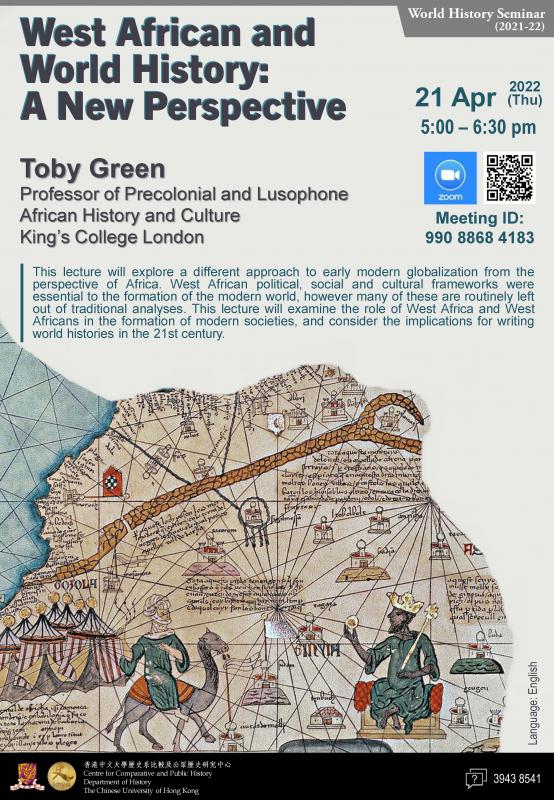
This lecture will explore a different approach to early modern globalization from the perspective of Africa. West African political, social and cultural frameworks were essential to the formation of the modern world, however many of these are routinely left out of traditional analyses. This lecture will examine the role of West Africa and West Africans in the formation of modern societies, and consider the implications for writing world histories in the 21st century.
Speaker
Prof. Toby GREEN
Professor of Precolonial and Lusophone African History and Culture
Department of History, King’s College London
Conducted online via ZOOM
(Meeting ID: 990 8868 4183)
https://cuhk.zoom.us/j/99088684183
Other Upcoming Events
Congratulations to Professor Rowena He!
Professor Rowena Xiaoqing He from the Department of History has been awarded the National Humanities Center (NHC) Fellowship and will be in residence at NHC as a Luce East Asia Fellow for the academic year of 2022-23. She is among the 33 leading scholars selected from an international competition of 592 applicants from across the humanities.

As a historian of modern and contemporary China, Professor He has been working on her next book on the roots and development of Chinese student nationalism abroad, focusing on the youths’ evolving life experience in changing contexts at home and abroad. At the NHC, she will continue this longitudinal study, expanding her research cohort to include mainland students as well as local students in Hong Kong. Drawing on concepts of political socialization and identity, as well as Chinese intellectual traditions of Confucian dissent and the “second kind of loyalty”, the project explores the relationship between historical memories and generational differences in the understanding of national loyalty and civic responsibilities. Professor He hopes the project will cultivate dialogues among groups from different backgrounds, and shed light on what young people need to become informed and responsible citizens.
The National Humanities Center (NHC) is the world’s only independent institution exclusively dedicated to fostering advanced research in the humanities. The Center is devoted to advancing significant humanistic study and reflection and to making those insights available both inside and outside the academic world.
Philosophy - Departmental Seminar: From Encountering Other Languages to the Language of Phenomenology: Merleau-Ponty and the Problem of Speech
Speaker:
Prof. Hayden Kee
Assistant Professor, Department of Philosophy, CUHK
Abstract:
Merleau-Ponty’s phenomenology of language is a central yet underdeveloped component of his total philosophical project. The recent publication of his 1953-1954 lectures on The Problem of Speech (2020) sheds light on his understanding of language at a critical moment in the development of this thought. In this talk, I interpret some key themes from the lectures. (1) Merleau-Ponty provides a dialectical account of the emergence of the mature philosophical and phenomenological understanding of speech and language. A key moment of this dialectical process is the encounter with foreign languages, which challenges our captivity and captivation within our own language. Merleau-Ponty illustrates this through the example of the European linguist’s encounter with the Chinese language. (2) The discussion of the encounter with other languages allows Merleau-Ponty to propose the idea of a “concrete universality” of human linguistic experience in spite of the genuine and radical disparities between human languages. I propose that we understand language as a “lateral universal” (Lau 2016). (3) The understanding of language advanced here has consequences for phenomenological method. Because phenomenology requires a language, and because the phenomenologist’s way of being in the world is pervasively linguistic, language cannot be simply and directly suspended at the outset of phenomenology. However, Merleau-Ponty’s indirect method can bring it into view for the phenomenologist.
Works cited
Lau, Kwok-Ying. Phenomenology and Intercultural Understanding: Toward a New Cultural Flesh. Springer, 2016.
Merleau-Ponty, Maurice. Le problème de la parole : Cours au collège de France. Notes, 1953-1954. Edited by Franck Robert, Emmanuel de Saint Aubert, and Lovisa Andén. Metis Presses, 2020.
Other Upcoming Events
“Artistic Crosscurrents from Guangdong” Lecture Series: Lecture III
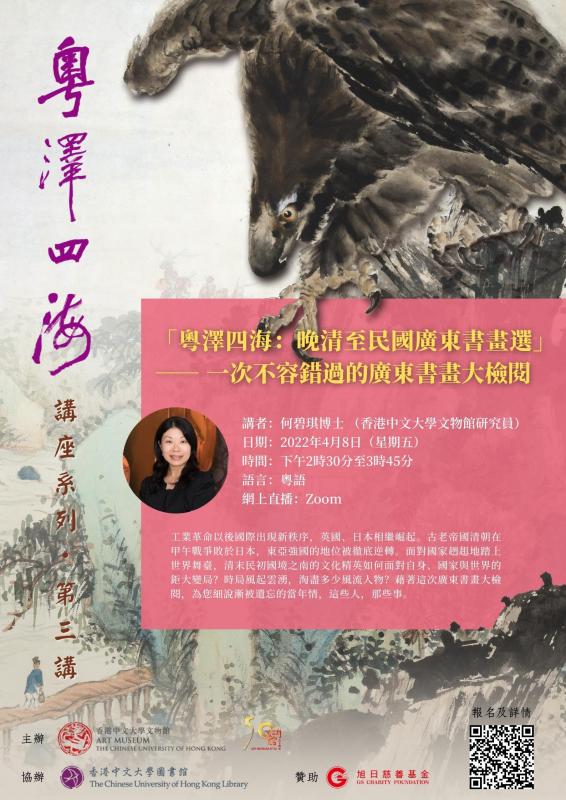
工業革命以後國際出現新秩序,英國、日本相繼崛起。古老帝國清朝在甲午戰爭敗於日本,東亞強國的地位被徹底逆轉。面對國家趔趄地踏上世界舞臺,清末民初國境之南的文化精英如何面對自身、國家與世界的鉅大變局?時局風起雲湧,淘盡多少風流人物?藉著這次廣東書畫大檢閱,為您細說漸被遺忘的當年情,這些人,那些事。
講者
何碧琪博士(香港中文大學文物館研究員)
台灣大學藝術史研究所博士,現任香港中文大學文物館研究員,杭州西泠印社社員。專著包括《廣納百川:明至清中期廣東書畫選》及《淳化閣帖史話》。編撰《典雅勁健:香港中文大學藏甲骨集》、《北山汲古:碑帖銘刻拓本》等並籌辦相關展覽,促成四種中大文物館藏宋拓珍本於東京國立博物館《書聖之後——顏真卿及其時代書法特展》展出。於《故宮學刊》、《故宮學術季刊》等期刊發表論文三十多篇,先後赴北京故宮博物院、國家圖書館、上海博物館、浙江大學、德國海德堡大學等演講及發表。2016及2020年為中大文物館申報二十件拓本列入由中國國務院審批的《國家珍貴古籍名錄》,是首次有香港院校的藏品獲選。近年於文物館為德愔琴社、一才鑼鼓等舉辦音樂會,教授「中國繪畫鑑賞」,參與香港電台「呼吸美學」拍攝,以深入淺出方式積極推廣中國文化與藝術。
Enquiry
3943 7374/ eocartmuseum@cuhk.edu.hk
Other Upcoming Events
Neurocognitive Reorganization of Language Comprehension In The Aging Mind
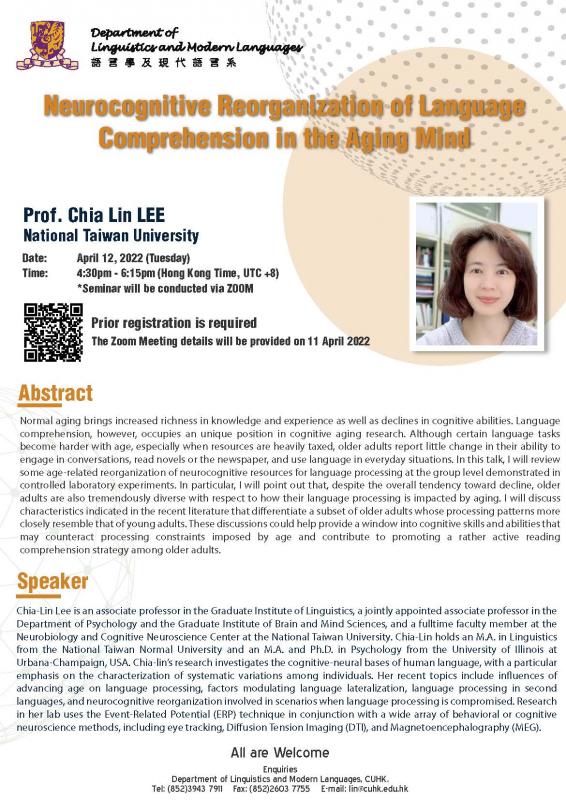
Normal aging brings increased richness in knowledge and experience as well as declines in cognitive abilities. Language comprehension, however, occupies an unique position in cognitive aging research. Although certain language tasks become harder with age, especially when resources are heavily taxed, older adults report little change in their ability to engage in conversations, read novels or the newspaper, and use language in everyday situations. In this talk, I will review some age-related reorganization of neurocognitive resources for language processing at the group level demonstrated in controlled laboratory experiments. In particular, I will point out that, despite the overall tendency toward decline, older adults are also tremendously diverse with respect to how their language processing is impacted by aging. I will discuss characteristics indicated in the recent literature that differentiate a subset of older adults whose processing patterns more closely resemble that of young adults. These discussions could help provide a window into cognitive skills and abilities that may counteract processing constraints imposed by age and contribute to promoting a rather active reading comprehension strategy among older adults.
Speaker
Professor Chia Lin LEE, National Taiwan University
Chia-Lin Lee is an associate professor in the Graduate Institute of Linguistics, a jointly appointed associate professor in the Department of Psychology and the Graduate Institute of Brain and Mind Sciences, and a fulltime faculty member at the Neurobiology and Cognitive Neuroscience Center at the National Taiwan University. Chia-Lin holds an M.A. in Linguistics from the National Taiwan Normal University and an M.A. and Ph.D. in Psychology from the University of Illinois at Urbana-Champaign, USA. Chia-lin’s research investigates the cognitive-neural bases of human language, with a particular emphasis on the characterization of systematic variations among individuals. Her recent topics include influences of advancing age on language processing, factors modulating language lateralization, language processing in second languages, and neurocognitive reorganization involved in scenarios when language processing is compromised. Research in her lab uses the Event-Related Potential (ERP) technique in conjunction with a wide array of behavioral or cognitive neuroscience methods, including eye tracking, Diffusion Tension Imaging (DTI), and Magnetoencephalography (MEG).

